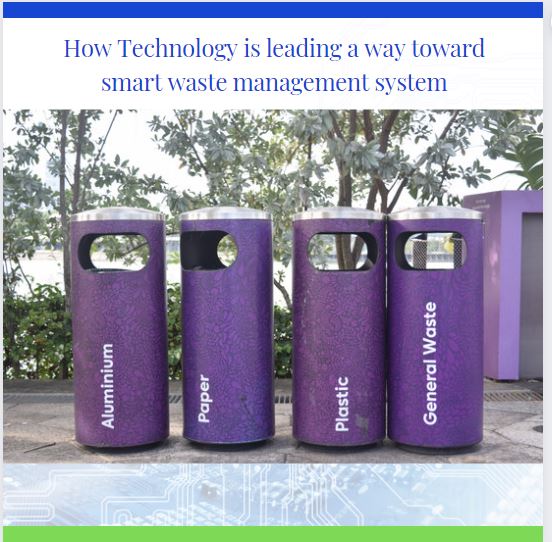Technology has the potential to transform waste management practices. Read the following blog to learn about new innovations happening in the waste management sector.
With the advent of Swachh Bharat initiatives, our country’s waste management infrastructure has improved considerably. According to a report published by the Swachh Bharat Mission (Urban), approximately 1.45 lakh tons of waste is generated per day from urban areas, out of which 23% is being processed and the rest ends up in the landfills. With the increasing population and corresponding waste generation, it’s imperative to make our waste management systems more effective, efficient, and smart.
Smart waste management refers to any system that uses technology to make trash collection more efficient, cost-effective, and environmentally friendly. It expedites the process and makes it free from human error. We are aware of different categories of wastes generated like solid & plastic waste, e-waste, biomedical waste, industrial hazardous waste, construction and demolition waste etc. Now, the processing of all these different categories of waste presents economic and environmental opportunities but also challenges of its own. In this blog, we have given a glimpse of how technology is helping overcome these challenges and help the waste management system become smart and efficient.
Any waste management system essentially has three components – waste segregation, waste collection, and waste processing. Waste segregation refers to waste sorting at the source into different categories (recyclable, compostable, hazardous, etc.) by waste generator. Waste collection can be carried by public or private entities depending on the scale and nature of waste and is then processed in processing facilities. Let us now see how technology is making each of these components smart and efficient-
Technology in waste segregation-
Waste segregation at the source is the first and most important step for effective waste management. The scale of waste generation is different in individual households, commercial, hotels, gated societies, companies, etc., and thus requires a different approach to enable effective waste segregation. For instance, at the household level waste generation is not much and sorting of waste can be done and managed by the dwellers only. However, when it comes to bulk waste generation human error or carelessness can affect the effectiveness of segregation and cause problems in the later stages like processing. Here, therefore technology can play an important role. In several countries, to help reduce improper waste sorting, AI-based Smart Bins are being utilized. These bins are capable of differentiating different objects like plastic, paper, e-waste, food waste, etc., and automatically sort them into separate compartments. This removes the component of human error and makes waste processing easier for processing facilities. In some cases, bins are also equipped with sensors to monitor the level of waste collected. Once the bins are full it automatically sends a signal to their respective collection agency saving them unnecessary trips and fuel.
Technology in the waste collection-
Technology can also help in improving the waste collection system. In Indore city, the municipality has set up a special cell to monitor the garbage collection vans. Each garbage collection van is equipped with GPS and the monitoring cell monitors the route of the van and notifies if any problem arises. This technology is commonly used in the logistics sector by many companies known as fleet management technology. This helps in optimizing vehicle routes according to traffic, weather or any road blockages. Incorporating this technology can make the waste collection more efficient in busy cities.
Technology in waste processing-
Waste processing is a final and crucial step of any waste management system. Depending on the type of waste, different processing methods are used. Improvement in recycling technology is opening new economic opportunities, for instance, most of the e-waste contains materials such as gold, silver, copper, platinum, palladium, and brass as well as hazardous toxins like mercury, recovering and recycling of e-waste thus hold economic, environmental and health benefits. Apart from this, technologies to convert waste-to-energy are gaining impetus and energy generation plants using organic matter are escalating. A very good example of waste to energy is Alappuzha district of Kerala where over 2,000 homes have constructed biogas plants in their homes, and use it for part of their cooking. Recently, in Mohali, a Bio-coal pilot plant has been set up which processes agricultural waste into bio-char or bio-coal pellets that can be sold to power generation plants or industries.
With continuous improvement and innovations, new technologies are coming up that use AI, IoT etc. and aid in improving waste management systems. However, many of such technologies are developed in foreign countries and sometimes don’t serve the purpose in the Indian scenario. This gives us an opportunity to develop indigenous technologies that can adapt to local conditions and make waste management effective and efficient.
Sources –
https://opengovasia.com/india-invites-tech-enabled-solutions-for-waste-management/
https://www.bigrentz.com/blog/smart-waste-management
https://wasteadvantagemag.com/5-futuristic-waste-management-technologies
